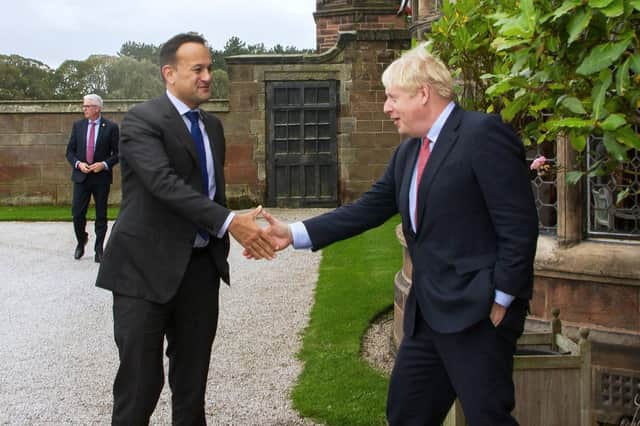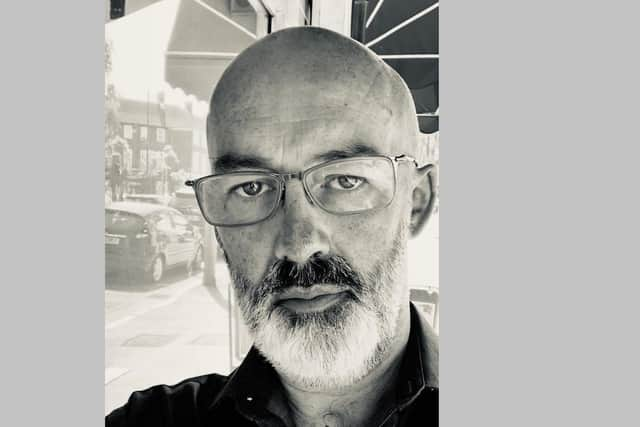Neil McCarthy: Leo Varadkar will go down as having decoupled Northern Ireland from Great Britain more than De Valera ever did


We would never see his like again, he went on; no more Haugheys in the same way there would be no more Parnells or De Valeras. The era of the dull plodding technocrat had arrived.
Waters however had not reckoned on Leo Varadkar, Fine Gael leader and taoiseach, who unexpectedly resigned from both positions on Wednesday.
Advertisement
Hide AdAdvertisement
Hide AdIn relation to Northern Ireland alone, Varadkar has been the most significant and disruptive Irish leader since De Valera. When Boris Johnson met him in Liverpool on October 10th 2019 and conceded the entire Irish and European Union position on a trade border down the Irish Sea, Varadkar arguably achieved more in terms of decoupling Northern Ireland from Great Britain than De Valera ever did.


The great unionist maverick, Lord Kilclooney, perhaps gave away the acute unease that Varadkar must have inspired in many unionists when he referred to him as “The Indian” on his Twitter account (Lord Kilclooney withdrew the tweet, insisting it was "not racist" but "shorthand for an Indian surname which I could not spell").
Varadkar was different. He broke with decades of Irish policy of seeking to work with unionists and instead, as Eoghan Harris put it in this newspaper, “treated [them] as outsiders, rather than as Irish people with whom we claim to seek unity”.
Varadkar did this of course in the wake of Brexit. It is one of the ironies of his premiership that, had it not been for Brexit, he may well have gone on to be seen as one of those taoisigh with whom unionists had had a good relationship, as they did for example with his former party colleague John Bruton.
Advertisement
Hide AdAdvertisement
Hide AdVaradkar’s economic viewpoint has always been a free market one and he clearly despises Sinn Féin not only for their ongoing justifications of the IRA’s murderous campaign, but also for what he would see as their potentially disastrous South American style socialist economic policies. John Bruton despised them for exactly the same reasons.
No-one who has seen it could ever forget his withering takedown of Sinn Féin’s Pearse Doherty in the Irish parliament in 2022 when Doherty sought to cast Varadkar and his party as uncaring capitalists and Varadkar in particular as someone of dubious morality (due to his being investigated for leaking sensitive information). Varadkar took the gloves off and referred to the “millions in donations from vagabonds who live in a caravan” that the republican party had received, to the fact that Doherty had “abused, mistreated a Garda Síochána” and been prosecuted for it, and to “the huge number of convicted criminals in your party… tax-dodgers… people who were convicted of murder”. He concluded by saying “we know what your party’s attitude is to rape and paedophiles and what you’ve done in relation to that”. Even Jim Allister could not better that.
Some unionists like Alex Kane have argued that Varadkar, in breaking with unionism, was merely pursuing the vital interests of his own country – ie the Republic – when those interests were directly threatened by Britain’s decision to leave the European Union. Unionists were collateral damage in this but not his intended target in other words. On the other hand, it is noteworthy how an Irish minister for finance, Brian Lenihan, acted when the Republic faced a genuinely devastating economic crisis in the crash of 2008. He was able to both ruthlessly pursue his nation’s vital interests and make the time and effort to reach out to unionists upon matters - such as the setting up of NAMA - which affected both jurisdictions. Sammy Wilson remembered Lenihan with great warmth for that.
Varadkar provided a glimpse of what could have been in his visit to the headquarters of the Orange Order in Belfast in June 2018. He did not put a foot wrong and the affection the local crowd showed him – many of them young, probably unionists – was real and touching.
Advertisement
Hide AdAdvertisement
Hide AdVaradkar was not only a big beast like De Valera in terms of the border. “The Ireland of De Valera” is now widely used as a synonym for the social conservatism of the Republic’s past. It is conceivable that in the future “Varadkar’s Ireland” will be used as a synonym for the dizzying experiment in social liberalism and multiculturalism witnessed these past few years under his watch.
Varadkar was Ireland’s answer to Canada’s Trudeau and New Zealand’s Jacinda Ardern. Has the revolution he helped start now devoured one of its own?
Neil McCarthy is a writer and teacher based in Dublin and London